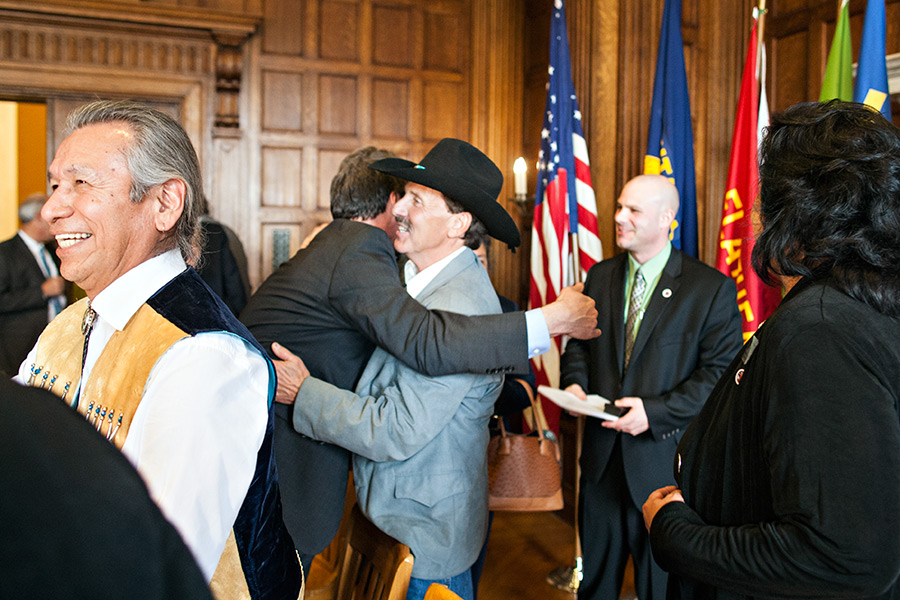A proposed alternative to the Confederated Salish and Kootenai Tribes’ hard-won water compact has drawn the ire of tribal leaders and the head of the state Department of Natural Resources and Conservation, who called the petition a distraction that undermines the work and negotiation poured into a bill that ratifies a critical water rights deal that took decades to negotiate.
The complex measure quantifies and defines the federally reserved water rights for the tribes and includes protections for those with existing rights, affecting water use on the Flathead Indian Reservation and throughout western Montana.
The compact, which has been at the center of a tumultuous political battle for decades, received the Montana Legislature’s approval in 2015, a decision that was legally challenged by the board that oversees irrigation on the Flathead Indian Reservation.
The Montana Supreme Court ultimately upheld the CSKT’s compact, ruling that the legislatively approved water rights measure is constitutionally intact.
But the compact still requires Congressional approval, and a group of state lawmakers and other opponents of the compact have come forward with an alternative proposal, dubbing it the “People’s Compact” and billing it as a less-costly version of the existing compact that leaves out some of the most controversial elements.
In the Flathead, supporters of the alternative include state Rep. Carl Glimm, R-Kila; Sen. Al Olszewski, R-Kalispell; Rep. Mark Noland, R-Bigfork; Sen. Mark Blasdel, R-Kalispell; and Sen. Keith Regier, R-Kalispell. The lawmakers have appeared at recent meetings to explain the alternative proposal and how they’ll introduce it to federal lawmakers.
“This is a petition of local people that we intend to bring to the federal government for redress,” Olszewski said.
The main thrust of the People’s Compact is to protect water rights of non-tribal members on the reservation, with proponents arguing that the version passed by the Montana Legislature sets a dangerous legal precedent in securing tribal water rights outside the reservation.
But state and tribal leaders, as well as the Republican lawmaker who carried the compact bill, have derided the alternative, casting it as unnecessary and reckless.
Montana Department of Natural Resources and Conservation Director John Tubbs, in a scathing letter opposing the People’s Compact, said the existing compact received broad bipartisan support and, in the absence of it, Montana would face a costly scenario in which more than 10,000 off-reservation water claims that would be adjudicated by the Montana Water Court.
“The State of Montana has a people’s compact. It was created through more than 70 public negotiating sessions over 36 years between the Confederated Salish and Kootenai Tribes, the United States, and the State of Montana,” Tubbs wrote. “It received extensive legislative input and public comment at meetings, through letters and email. It was ratified with bipartisan support by the Montana Legislature and the broad support of citizens, municipalities, agricultural interests and other stakeholders. It’s now in Washington awaiting Congressional action, with representatives of the Salish and Kootenai tribes in active negotiations with the U.S. Department of Interior.”
He continued: “A compact settlement is the result of negotiations between parties that come together in good faith to represent their interests. The recently publicized ‘peoples compact’ is neither a work of the people nor a legitimate compact. It was created without any participation from the Salish and Kootenai tribes, the United States, or the State of Montana. It is a misrepresentation of the compact process.”
The CSKT filed 1,720 on-reservation water claims and 1,094 off-reservation instream water claims in 51 of Montana’s 85 adjudication basins. The U.S. Department of Justice also filed 7,295 claims in trust for the CSKT, including 1,094 off-reservation claims that are identical to those filed by the tribes. In the absence of a compact, all 10,109 claims would be adjudicated by the Montana Water Court. The tribes’ off-reservation claims carry the earliest priority date of any water claims in Montana.
Robert McDonald, communications director for the CSKT, said there’s been no outreach to the tribes by proponents of the alternative compact, and the tribes continue to support the bill passed by the state Legislature.
“To date we’ve heard nothing from the authors of this propaganda or anyone associated with it. We haven’t been provided a copy of any actual proposal or any opportunity for input,” McDonald said. “The materials we have seen consist of the same old propaganda and distorted fear-mongering that Compact opponents have peddled for years. Clearly, the authors have a fundamental misunderstanding of the facts and the law, and little respect for Montana’s elected officials or its legislative process. We will continue working to secure federal ratification of the Compact and to educate people on these important issues.”
Sen. Chas Vincent, R-Libby, sponsored the water compact, and in 2015 he regularly squared off against opponents — mostly irrigators and other water-users on and around the Flathead Indian Reservation who say the compact strikes an unfair balance of power over water administration on the 1.3 million-acre reservation.
Vincent disagrees, saying the agreement protects existing water uses, while settling the tribes’ water rights, thus avoiding years of litigation in Water Court over those rights. The alternative compact, Vincent said, is another example of misperceptions surrounding the existing agreement.
“All that I have seen are comments that clearly illustrate an unfortunate reality — that there are some who would rather spend a great deal of time trying to convince others about what the CSKT Compact isn’t, rather than taking the time to understand what the CSKT Compact is,” Vincent said.
At the federal level, U.S. Sen. Jon Tester, who introduced the existing compact in the U.S. Senate in 2016, outright rejected the People’s Compact, but Republican members of Montana’s Congressional delegation said they’d be open to modifications to the compact.
“I welcome the effort of the opponents of the current proposed settlement for bringing new ideas to the table for a path forward. I will continue working and listening to all stakeholders to help reach a fair solution that can bring Montanans together,” Daines said in a statement.
